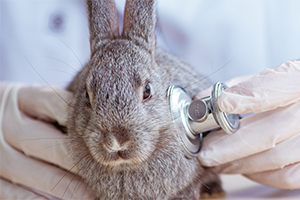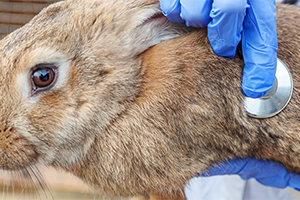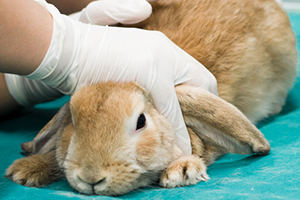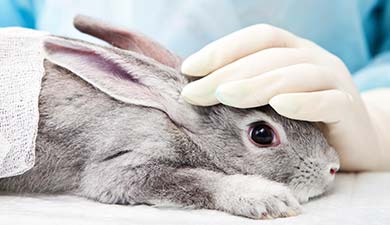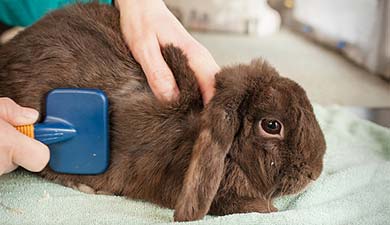Everything you need to know about myxomatosis
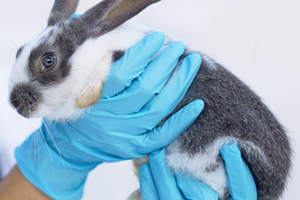
Quick Links
What is myxomatosis?
How does myxomatosis in rabbits spread?
Myxomatosis typically spreads from wild rabbits to domestic pet rabbits via:
- Blood-sucking insects like mosquitoes, fleas, ticks and mites
- Contact with contaminated items like water bowls, hutches and food bowls
- Aerosol droplets and discharge from infected rabbits (close contact only)
Myxomatosis symptoms
Peracute myxomatosis
Acute myxomatosis
This form has more pronounced symptoms, including:
- Swelling around the eyes and genitals
- Sores and abscesses around the head area
- Seizures
- Lethargy
- Fever
Secondary bacterial infections like pneumonia often accompany acute myxomatosis. Unfortunately, around 90% of rabbits die within 10 days of contracting this form of the disease.
Chronic myxomatosis
If a rabbit survives acute myxomatosis, they may then develop symptoms of chronic myxomatosis, including:
- Swelling around the eyes
- Discharge from the eyes and ears
- Difficulty breathing
Survival rates for chronic myxomatosis are low, with many rabbits dying within around two weeks of moving into the chronic stage. But if they do survive, they’ll be immune from contracting myxomatosis for the rest of their lives.
How do you treat myxomatosis in rabbits?
If you think your rabbit is showing any signs of myxomatosis, take them to the vet as soon as possible.
While there’s no specific medication for treating myxomatosis, your vet may formulate a plan for intensive supportive care, including:
- Giving antibiotics to prevent secondary infections
- Administering fluids via a drip
- Keeping your rabbit warm
- Helping your rabbit eat
This treatment is usually only offered to vaccinated rabbits, as they tend to contract a milder form of myxomatosis. Your rabbit may need to spend a significant amount of time staying at the vet, so rabbit insurance can help cover some of these costs.
Myxomatosis has a low survival rate, so while there’s a small chance vaccinated rabbits may recover, vets may recommend euthanasia on humane grounds, to prevent further suffering. Even with intensive treatment, most unvaccinated rabbits don’t recover once they’ve contracted myxomatosis.
Can you touch a rabbit with myxomatosis?
If you suspect your rabbit has myxomatosis, you can touch them as normal, but it’s very important to wash your hands and change your clothes before handling any other rabbits.
If you see a wild rabbit with myxomatosis, you may decide to take them to your local vet so they can be humanely euthanised rather than suffer. Wear gloves to handle them if possible, then change your clothes and wash your hands after handling, to avoid spreading the virus to any other rabbits.
How can you prevent myxomatosis?
The only way to reduce the risk of rabbits contracting myxomatosis is to have them vaccinated. Most brands of the vaccine can be given from five weeks old, with an annual booster. In rare cases, vaccinated rabbits may still catch myxomatosis, but their symptoms should be milder and their chances of recovering are much higher.
Indoor rabbits should also be vaccinated, as they may still come into contact with insects or contaminated items.
Most vets now advise a combination vaccine that covers myxomatosis and Rabbit Viral Haemorrhagic Disease (RHD-1 and RHD-2).
It’s also important to make sure rabbits are treated for fleas. Spot-on treatments are the best option and can be applied to the back of your rabbits’ necks. Flea treatments designed for dogs and cats aren’t suitable for rabbits, so make sure to ask your vet for a rabbit-safe formulation.
Regularly cleaning and disinfecting your rabbits’ hutch also helps reduce the likelihood of fleas or other insects taking up residence. If there are any breeding grounds for mosquitoes nearby, like stagnant water, remove these or use mosquito netting around your rabbits’ hutch.
If your garden is visited by wild rabbits or hares, try to restrict their access to any areas that your rabbits use.
If adding a new rabbit to your family, wait to introduce them to your existing rabbits until three weeks after they’re fully vaccinated.
Petplan is a trading name of Pet Plan Limited (Registered in England No. 1282939) and Allianz Insurance plc (Registered in England No. 84638), Registered office: 57 Ladymead, Guildford, Surrey GU1 1DB.
Pet Plan Limited is authorised and regulated by the Financial Conduct Authority. Financial Services Register No. 311969. Allianz Insurance plc is authorised by the Prudential Regulation Authority and regulated by the Financial Conduct Authority and the Prudential Regulation Authority. Financial Services Register No. 121849. Pet Plan Limited is a subsidiary of Allianz Insurance plc.
